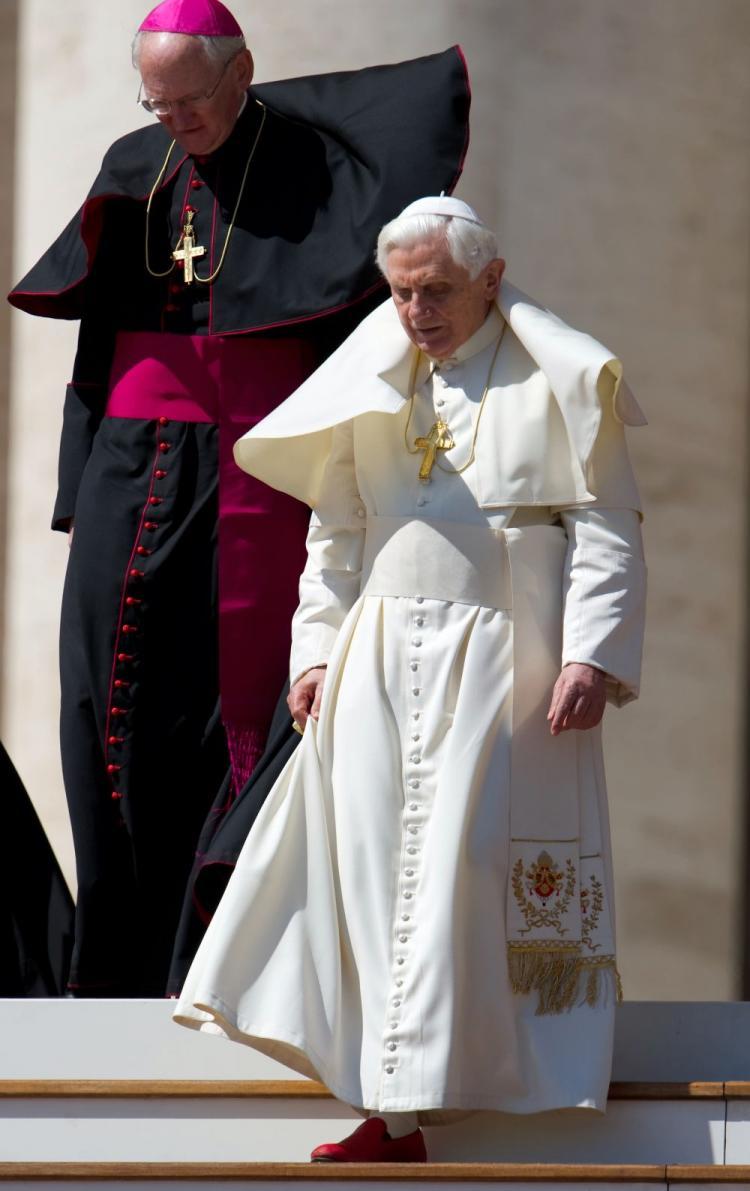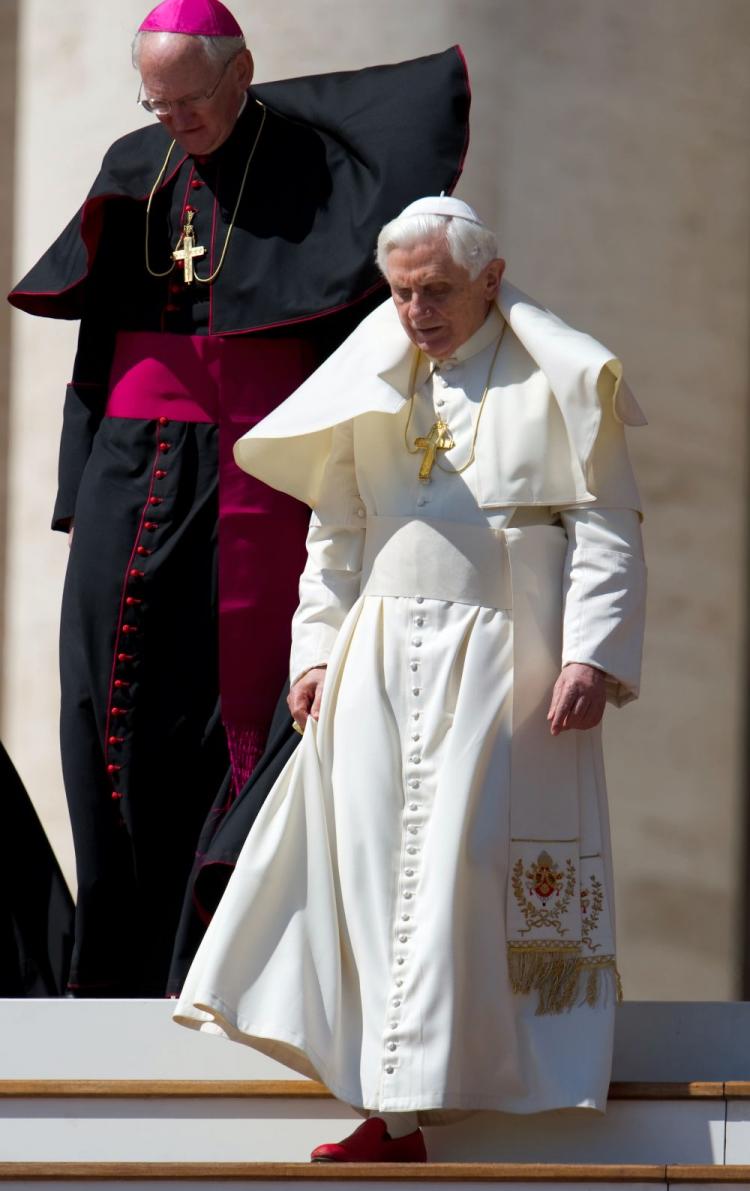LONDON—Senior clerics in Rome could have hoped for a better Easter. Over the last three months, the Catholic Church has been shaken to its foundations by revelations over the role of its leadership in covering up cases of sexual abuse by its priests.
In Ireland, Germany, Rome, the United States and now in Britain, over 700 harrowing stories of abuse dating back decades have come to light. In many of the cases, serious failings have emerged in how senior priests balanced the need to protect victims against the fear of negative publicity.
Following a series of recent revelations, a question mark now hangs over Pope Benedict XVI himself for allegedly failing to act swiftly in disciplining priests who have been convicted of child abuse.
In a sign of mounting public anger, the pontiff faces the threat of arrest during a pastoral visit to Britain in September this year.
Richard Dawkins, the atheist campaigner, and author Christopher Hitchens are preparing a legal ambush for the pontiff on charges of crimes against humanity.
It is believed that the pope can be arrested on the same legal principle that was used to arrest the late Chilean dictator Augusto Pinochet, when he visited the U.K. in 1998.
Hitchens, an avowed atheist and author of the book “God Is Not Great,” said that the pope is “not above or outside the law.”
“The institutionalized concealment of child rape is a crime under any law and demands not private ceremonies of repentance or church-funded payoffs, but justice and punishment,” he said in a statement.
The pair has commission barrister Geoffrey Robertson and solicitor Mark Stephens to find a legal justification for arrest.
They believe that the Vatican is not a sovereign state under international law, despite being recognized as such by 119 countries.
“There is every possibility of legal action against the pope occurring,” said Stephens.
“Geoffrey and I have both come to the view that the Vatican is not actually a state in international law. It is not recognized by the U.N., it does not have borders that are policed and its relations are not of a full diplomatic nature.”
However, the statement has already come under attack from leading catholics. Tom Craven, president of The Catholic League said the proposed legal action was an “attack on religion” and that the allegations against the pope were “baseless and wrong.”
Many of the allegations against the pope refer to a time when he was known as Cardinal Joseph Ratzinger, and was serving as the head of the Congregation for the Doctrine of the Faith, which has responsibility for tackling abuse by clerics.
Delayed Discipline in San Francisco
Stephen Kiesle, a San Francisco priest, was in 1978 sentenced to three years probation on charges of lewd conduct after he abused two young boys in a church rectory.
After returning to pastoral work in 1981, Kiesle asked to be removed from the priesthood. At the time, all such requests required approval from Ratzinger’s office.
A letter obtained by the Associated Press from Ratzinger in 1985, acknowledged that the matter was of “grave significance,” but Ratzinger suggested that the case needed careful review.
It was not until 1987—five and a half years after Kiesle’s original application—that he was formally defrocked.
In the interim, he had volunteered as a youth minister at a suburban church. No abuses are believed to have occurred during this time.
Concerned with the time it was taking to approve the laicization, California church officials wrote at least three times to Ratzinger to check the status of Kiesle’s case. According to AP, at one point a Vatican official wrote to say that the file may have been lost. He suggested resubmitting the material.
Officials have denied that the case shows any evidence of a cover-up. Vatican attorney Jeffrey Lena said the matter proceeded “expeditiously, not by modern standards, but by those standards at the time.”
Kiesle was sentenced to six years in prison in 2004 for molesting a girl in 1995.
Church Trial Canceled After Letter to Ratzinger
Ratzinger served as head of the Congregation for the Doctrine of the Faith from 1981 until 2005, where he was charged with monitoring any accusations of abuse.
In the post, he was accused of failing in his duty to bring Lawrence C. Murphy, a Wisconsin priest, to justice for allegedly abusing up to 200 children at a school for the deaf, in the years between 1950 and 1974.
While Rembert G. Weakland, archbishop of Milwaukee at the time, tried to push the case forward, the process was ultimately halted by Ratzinger’s deputy, Cardinal Tarcisio Bertone, after Murphy wrote directly to Ratzinger to appeal his case.
“I simply want to live out the time that I have left in the dignity of my priesthood,” Father Murphy wrote near the end of his life to Ratzinger. “I ask your kind assistance in this matter.”
Jeff Anderson, the lawyer who obtained the internal church documents on the victim’s behalf, said that it “shows a direct line from the victims through the bishops and directly to the man who is now pope.”
Vatican spokesman Father Federico Lombardi defended the decision not to defrock Murphy, saying that he was “elderly and in very poor health” and that he was “living in seclusion, and no allegations of abuse had been reported in over 20 years.”
Business as Usual for Priest Convicted of Child Abuse
By far the most damaging allegation to involve the pope took place in Munich, where Ratzinger was archbishop from 1977 to 1981.
It involves the case of Peter Hullermann, a Catholic priest who—despite being convicted of child abuse in 1986—was allowed to continue working with children up until mid-March this year.
He is accused of dozens of cases of further child abuse during this period.
Hullerman first came to the attention of church authorities in Germany in 1979, when parents accused him of sexual assaulting children at his parish in Essen.
As archbishop, Ratzinger was reported to have presided over a meeting in which it was agreed that Hullerman be sent for psychiatric treatment in order to overcome his abnormal impulses.
He was transferred to Munich, and almost as soon as the treatment was started, he was allowed to resume full duties. Six years later, he was convicted of molesting children at another parish.
When news of the scandal broke, it was claimed that Ratzinger had had no knowledge of Hullermann returning to duties. However, the New York Times reported that a memo had been sent by Ratzinger’s deputy at the time—Gerhard Gruber—informing him of the decision to allow Hullermann to resume pastoral work.
Despite that, church officials have said that there were 1,000 priests in Ratzinger’s diocese, and that he could not have possibly known the activities of each of them.
At the time of the accusations, papal spokesman Father Federico Lombardi told Vatican Radio accusations of a cover-up were “defamatory.”
“There have been those who have tried, with a certain aggressive persistence, in Regensburg and Munich, to look for elements to personally involve the Holy Father in the matter of abuses,” he said, adding that those efforts had failed.
Fear of Scandal
As head of the watchdog in charge of investigating abuses, Ratzinger walked a fine line between the need to see justice done, and a clerical rule that advises on the importance of avoiding public scandal.
Marco Ventura, a professor of religious law at the University of Siena, believes that the church leadership may have been influenced on the matter by the canon laws laid down by Pope Benedict XV in 1917.
“Preventing scandals from taking place is crucial from all points of view,” he told the Star newspaper in Canada.
“The bishop is in charge of determining how to fight against scandals which could affect the good image of the church,” he added.
Despite the fact that Ratzinger’s name has been associated with the above cases, rightly or wrongly, there are many examples where he was simply frustrated by restrictions placed on him by his superiors in the previous pontifical administration.
Colleagues have pointed out how Ratzinger attempted to investigate claims of abuse by Cardinal Hans Hermann Groer, an Austrian friend of the previous pope, John Paul. Groer was later alleged to have abused up to 2,000 children.
Groer’s successor Cardinal Christoph Schonborn, told the Times newspaper, that Ratzinger was blocked from doing so by “the Vatican.”
“[Ratzinger] made entirely clear efforts not to cover things up but to tackle and investigate them. This was not always met with approval in the Vatican,” he said.
Ratzinger, who in 2005 described pedophile priests as “the filth of the church” has made the issue a focus of his administration in recent months, with an unprecedented letter to the Irish congregation following abuse claims there.
Whether or not he will survive the current storm, will depend largely on how much importance he will give to reforming and improving the system for reporting abuse—notwithstanding an arrest warrant.






